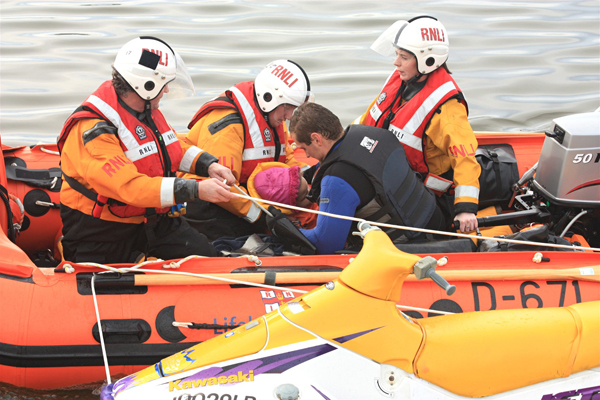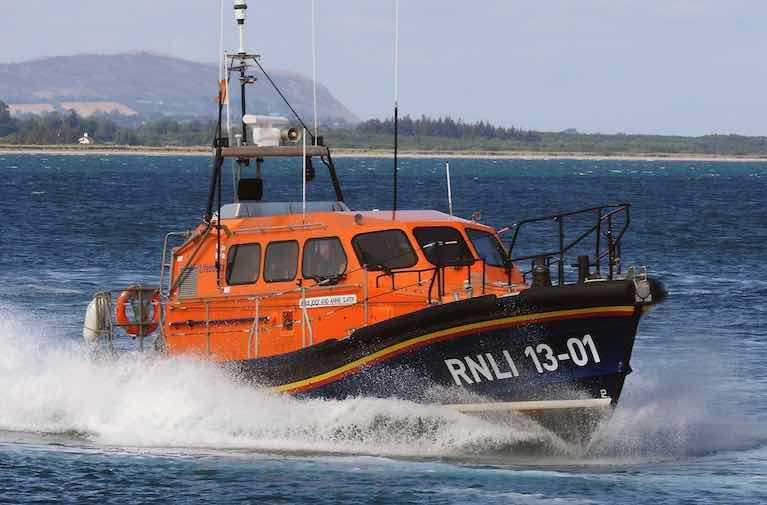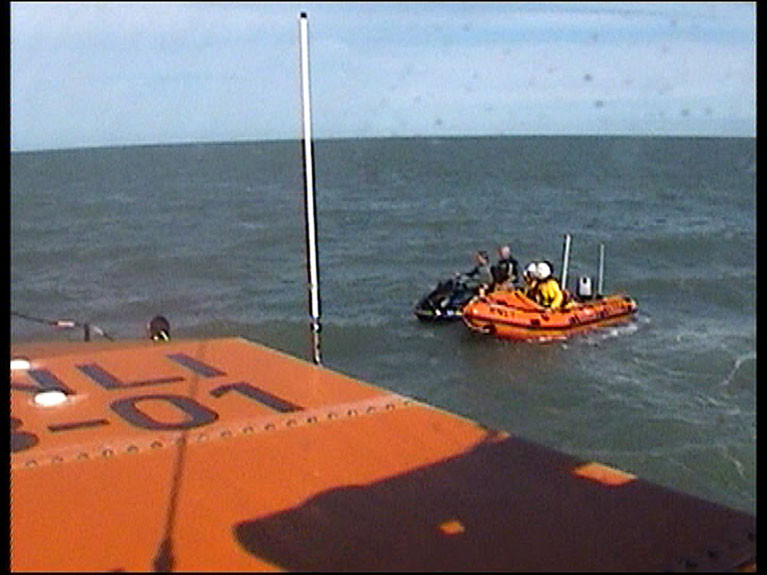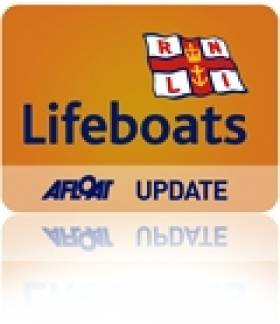Displaying items by tag: Wicklow RNLI
Wicklow RNLI Rescues Three Fishermen Stranded at Sea
Wicklow RNLI rescued three fishermen on Monday, March 18, after their boat suffered mechanical failure. The all-weather lifeboat RNLB Bridie O'Shea, under the command of Coxswain Alan Goucher, was called to the scene at 12.19 pm, 11 nautical miles northeast of Wicklow Harbour.
The volunteer lifeboat crew reached the casualty vessel within 30 minutes of launching despite challenging conditions with winds from the northeast at force 5/6, moderate seas, and good visibility. After assessing the situation, Coxswain Goucher decided that a tow was the best course of action.
The crew managed to establish a tow and set a course for the nearest safe port at Wicklow Harbour, with the casualty vessel secured alongside at 3.50 pm.
Speaking after the call-out, Coxswain Alan Goucher said, "All the volunteer crew's training for these types of conditions was put to very good use today. We would like to remind everyone to have an effective means of communication in case of an emergency. That communication helped us locate the casualty today."
The Wicklow RNLI operates two lifeboats, an inshore D-class lifeboat, and an all-weather Trent class lifeboat. The charity has been saving lives in Wicklow since 1857.
Wicklow RNLI Lifeboat Tow Fishing Boat to Safety
Wicklow RNLI lifeboat brought two fishermen to safety today after their vessel developed engine trouble six miles east of Greystones harbour.
The all-weather lifeboat under the command of Coxswain Tommy McAulay was tasked by the Coast Guard at 12:15pm and proceeded north to assist the fishermen.
The seven-metre fishing vessel with engine failure was located thirty minutes later, near the East Codling Buoy. Conditions on scene were sea state slight with good visibility. A towline was passed to the fishing vessel and a course was set for Greystones Harbour.
The fishing vessel was brought alongside at Greystones harbour and the two crew were landed safely ashore just before 2pm this afternoon.
Wicklow RNLI Lifeboat Assist Fishing Vessel in Multi Agency Search
Wicklow all-weather RNLI lifeboat launched shortly before 11 pm this morning (Tuesday, 6 October) to assist in a multi-agency search for a missing person from a Dublin – Holyhead ferry.
Fifteen minutes after launching Wicklow lifeboat was re-tasked by the Coast Guard to assist a fishing vessel with machinery failure south of Greystones. The lifeboat under the command of Coxswain Nick Keogh located the stricken fishing vessel off Kilcoole at 11:20 am. Conditions at the scene were sea state moderate, with northwesterly wind force four.
A towline was quickly established, and the ten-metre fishing boat was taken in tow back to Wicklow harbour, where the four fishermen were landed safely ashore at lunchtime.
After refuelling and a crew change, Wicklow lifeboat returned to sea to resume a search for the missing sailor off the Wicklow Coast. The operation which involved RNLI lifeboats from Ireland and Wales, Coast Guard helicopters and fixed-wing aircraft from the Irish Air Corps and UK Coastguard, carried out a co-ordinated search covering a large area of the Irish sea.
The multi-agency operation ended late on Tuesday afternoon and Wicklow lifeboat returned to Station.
Wicklow lifeboat volunteers responded to four incidents during a 24-hour period as the Station resumed crew training over the weekend.
The first callout on Saturday afternoon (August 8) and involved both the Inshore and all-weather lifeboat, they diverted from a crew exercise after being tasked to Brittas Bay by the Coast Guard at 4:15 pm to reports of a jet ski in difficulty off the popular beach. On arrival at the scene the Inshore lifeboat located two men on a drifting jet ski with engine failure one mile off Brittas Bay beach, they were transferred onto the all-weather lifeboat and landed safely at Potter’s Point, while the inshore lifeboat towed the jet ski ashore.
The second callout came on Sunday morning as the all-weather lifeboat launched at 03:25 am to join Arklow lifeboat in a combined operation, to assist a solo sailor on a yacht with a rope fouled prop. Initial reports indicated the yacht's position was a few miles north of Arklow port, but it was located by Arklow lifeboat about two miles south of the Horseshoe Buoy near Wicklow head. The eight-metre yacht was fouled in ropes and unable to make any headway. Conditions on scene were sea state slight with wind north-west force three. Arklow lifeboat transferred a crew member onto the yacht to assist the sailor and free the obstruction from the prop. A towline was established with Wicklow Lifeboat before 4 am and the stricken yacht was towed back towards Wicklow harbour. The vessel alongside the South Quay shortly before 6 am and landed the solo sailor safely ashore.
 Video still of a yacht with the solo sailor being towed into Wicklow Photo: RNLI
Video still of a yacht with the solo sailor being towed into Wicklow Photo: RNLI
The third callout came two and a half hours later on Sunday morning when the all-weather lifeboat was launched at 08:39 am to reports of an 11metre fishing vessel in difficulties near the Six Mile Point. The lifeboat was alongside the fishing vessel 20 minutes after launching seven miles north of Wicklow harbour. The vessel with three fishermen had developed mechanical problems and was unable to return to the harbour under power. Conditions in the area were visibility fair with a moderate sea and wind northeast force three. The trawler was taken in tow back to Wicklow harbour and the lifeboat crew brought it alongside the South Quay just after 10 am.
The fourth call came after 2 pm on Sunday afternoon as the all-weather lifeboat diverted from a crew exercise to assist a yacht in difficulties four miles off the harbour. The yacht was brought safely alongside the East pier a short time later.
Speaking about the call outs, Lifeboat Press Officer for Wicklow RNLI, Tommy Dover said: ‘This was an extremely busy weekend for Wicklow RNLI as we also resumed crew training this weekend since the Covid-19 restrictions curtailed all training earlier this year. Between the crew exercises and callouts, nearly all of our volunteers were involved over the weekend and it was a milestone for trainee Ger Kennedy, who completed his first ‘Shout’ on the all-weather lifeboat.’
Wicklow Lifeboat Rescues Two People from Capsized Jet Ski
Wicklow RNLI inshore lifeboat was called into action shortly before 2pm yesterday afternoon (Saturday 30th October 2010) when two people got into difficulties while on a jet ski off Wicklow harbour.
The Coast Guard were alerted after vigilant members of the public spotted a man waving for help in the water off the East pier.
The lifeboat quickly located the 2 people a few hundred metres off Wicklow harbour, a young girl was taken onto the lifeboat and her father was taken from the water by the lifeboat crew, he was unable to get back onboard the jet ski after it overturned, but had managed to lift the young girl back onto the Jet ski until help arrived.
The lifeboat crew wrapped the young girl in a blanket to keep her warm as she had spent time in the cold water in light clothing. The father and daughter were taken back to Wicklow harbour and brought ashore cold and shaken but unharmed.
The lifeboat crew on this occasion were Lisa O Leary, John Docherty and Brian Sinnott.

Yesterday's rescue of Jetskiers off Wicklow harbour. Photo: Tommy Dover
RNLI Lifeboats in Ireland
Safety News
Rescue News from RNLI Lifeboats in Ireland
Coast Guard News from Ireland
Water Safety News from Ireland
Marine Casualty Investigation Board News





























































